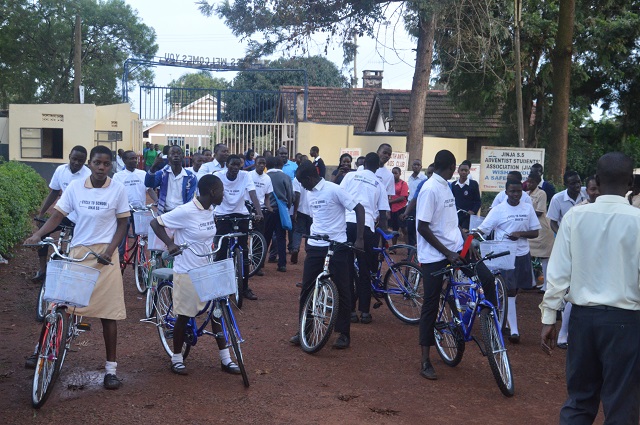
Increased demand for bicycles may be a turning point for African cities like Kampala. Photo by Najjiba Katesi/FABIO
As some countries creak open in the wake of COVID-19, businesses and workers rightly fear the rough road ahead. Over the past 10 weeks, 40 million U.S. workers have lost their jobs. Researchers at the University of Chicago estimate that 40% of these jobs are gone forever. Additional reports predict consumer spending could decrease by an unprecedented 40-50%. While COVID-19’s long-term economic impacts have yet to be seen, it is clear that “business as usual” may well be a pipedream.
The mobility service sector is among the hardest hit. Transit systems have seen up to 90% drops in ridership, massive revenue losses and service cutbacks. Uber reports that passenger bookings are down 70%. Ridesharing and dockless e-bike and e-scooter sharing services have suspended services in some cities, and Uber unceremoniously sold its e-bike service, Jump, in May.
For startups and companies working in the previously growing new mobility space, the financial horizon suddenly looks bleak. But investors looking to make positive impacts shouldn’t look the other way quite yet. New mobility service providers have been adapting to the crisis and are a key piece of the puzzle to helping cities build back better.
The Future Is Micro
As public transport agencies cut back services and social distancing has become the norm, bicycling and micromobility services are one of the few modes of urban transport that have actually benefited in some places. In the United States, at the onset of shutdowns, users flocked to bikeshare stations. Some urban trails are seeing nearly five times their usual bicycle traffic. In Beijing, where lockdown restrictions have been loosening, bikeshare rides increased by almost 200%.
To accommodate demand for cycling and pedestrian space, cities across the world are shutting down roads to cars and propping up new bike lanes. Seattle, Bogotá, Paris, London and other cities are set to make these changes permanent, opening miles of road to bikers and walkers and expediting related infrastructure projects.
Bikeshare companies are adapting too. Yulu, a Bangalore-based bicycle and electric scooter sharing company with 15,000 bikes in five cities across India, anticipates more bike-based commutes. They are offering users extended rental periods up to 90 days to improve the availability of bikes to essential workers. Users can also see when a bike was last disinfected. In China, during the pandemic in Wuhan, Meituan Bikeshare stayed open for essential workers and logged 2.3 million trips, serving more than 286,000 people covering a distance equivalent to 81 laps around the equator.
Increased demand for bicycles may be a turning point for cities in Africa in particular, where cycling currently makes up a tiny fraction of the transport share and commuters primarily walk or take paratransit.
In Kampala, Uganda, where cyclists represent just 1% of commuters, bicycle sales and repairs have been rising. Activists are advocating for safe bike infrastructure to aid in COVID-19 recovery, reduce congestion and improve public health. Najjiba Katesi, director of the Jinja-based NGO First African Bicycle Information Organisation (FABIO) and self-proclaimed “bicycle woman,” says that since the start of travel restrictions in the city, both commuters and officials are warming up to bicycling as an alternative to motorized vehicles and motorcycle taxis.
Katesi explains that people are more cost sensitive than ever before, especially when it comes to transportation, which often comprise 25% of median household expenditures in the region. “People are looking to save money on transport, and now that people are on bicycles, there’s no going back,” she says. FABIO is even piloting cargo bikes as a means to deliver food and health supplies to rural villages.
However, much work needs to be done to install dedicated cycling infrastructure and expand access to safe, affordable bikes, especially near busy marketplaces and mobility hubs, Katesi says. “We have issues with drivers invading bicycle lanes… Bicyclists are also worried about leaving their bicycles at markets when there’s no bike racks [to lock up].”
Improved safety conditions for micromobility travel modes, like bikes, can bring serious boons to cities. Bicycles are zero-emission, safer and healthier, and take up less space than cars. They provide affordable alternatives to and last-mile connectivity for public transport, which can greatly affect the physical form of cities. And their service area is 15 times higher than walking alone, meaning residents have better access to jobs and essential services like food and healthcare. But riders and new mobility companies alike need to feel comfortable with their investments before pushing off.
Your Package Is on the Way
COVID-19 has shown just how vulnerable global supply chains can be. Hospitals exhaust critical supplies in 24 hours and grocery stores run out of produce in 72 hours. Logistics startups report that manufacturers, retailers, suppliers and shippers are more worried about supply chain disruptions than ever before.
Shared mobility providers are rushing to fill the demand for sustainable urban deliveries. Uber recently purchased Postmates, an app-based food delivery service, pointing to consolidation in the saturated on-demand food delivery space. Ride-hailing and electric rickshaw companies in India are also pivoting to small parcel and food delivery. One company, Rapido, anticipates deliveries and logistics services to represent roughly 25% of its business moving forward.
In Kampala, where loosely regulated motorcycle taxis called boda bodas are the country’s second-largest employer, people are seeing more goods strapped to the back of bikes. SafeBoda, an app-based motorcycle taxi company that promotes safe driver training and helmet wearing, recently received UN funds to deliver groceries from 800 local markets to people’s doorsteps. SafeBoda delivery services reach roughly 85,000 customers every day now. There are ongoing concerns over road safety, but the market is clearly growing. Recent regulation requires all boda boda drivers to register with ride-hail companies, like SafeBoda, which may drive even more demand for app-based ride-hailing and delivery services.

Boda boda drivers using electric motorcycles can conveniently swap rechargeable batteries at one of Zembo’s solar-powered swapping stations around Kampala. Photo by Zembo
Electricity Is in the Air
While COVID-19 has forced electric vehicle manufacturers to power down, the future is no doubt looking electric. Companies like Lyft are committing to going fully electric, while data from last April shows that European buyers were more likely to opt for battery electric and hybrid vehicles than conventional combustion engines.
In China, post-pandemic stimulus plans are helping the disrupted economy rebound and a national electric vehicle agenda is a key component. Government tax breaks for plug-in hybrid and battery electric vehicles, as well as fuel cell vehicles, have been instrumental in nurturing the fledgling sector for years. Although subsidies have been scaling down in recent years, the government recently extended incentive policies for an additional two years. Measures include a 2.7 billion yuan ($381 million) investment for comprehensive charging infrastructure in cities such as Beijing, Shanghai, Tianjin and Jiangsu.
In Uganda, where less than half of residents have access to electricity, the public and private sectors are finding innovative ways to cut transport emissions. Companies like Bodawerk are retrofitting gas-powered motorcycles with second-hand batteries recycled from old laptops. Making the switch from gas to electric batteries cuts boda boda operating costs in half while doubling drivers’ income. Other companies, like Zembo, are helping boda boda drivers purchase their own battery-powered motorcycles and offering solar-powered battery swapping stations around Kampala.
Despite COVID-19, development partners are stepping up to help cities achieve zero-emission vehicles too. The Regional Electric Vehicle Value-chain Development (REVV’D) Program, for example, a collaboration between the UK Government and Shell Foundation, is supporting companies through grant funding in the electric vehicle markets in Ethiopia, Uganda and Rwanda. The goal is to support the deployment of over 500 electric vehicles and develop ecosystems that increase adoption of e-mobility in the informal transport sector. WRI and Shell Foundation are partners on the Inclusive, Impactful and Innovative Mobility (3IM) initiative, which seeks to raise the profile of and reduce barriers to scaling and investing in safe, clean and accessible urban mobility solutions.
Sustainable Mobility Is Still a Good Investment
Investors are increasingly recognizing that socially and environmentally responsible service models and technologies not only make positive impacts but can generate meaningful financial returns. And as investors are worried about weathering the coronavirus storm, mobility providers are showing themselves to be not just adaptive, but essential to cities’ recovery, ensuring health workers and patients have safe, accessible transportation and delivering food and other essentials straight to your doorstep.
Though a massive blow to the urban transport sector, it is possible the pandemic leads to a new understanding of the value of more resilient, cleaner, efficient transport. In cities around the world, people are experiencing clear skies and traffic-free streets for the first time in recent memory. Research has even linked lower air pollution to lower incidences of COVID-19 deaths.
As health and sanitation concerns go up and gas prices go down, many cities fear commuters will increasingly opt for personal vehicles. But there are many long-term trends pointing to the strong need for more sustainable and efficient transport in cities of all types. Lest we forget, the world still faces a climate emergency. Transitioning to fully electric fleets is projected to require a hefty $8.6 trillion initial investment, while shifting to sustainable mass transit modes like buses and light rail requires another $4 trillion. These investments are expected to bring huge returns on jobs and economic activity, but these benefits will only flow to those businesses and cities that are ready for change.
Natalie Wong, Business Development Advisor, Shell Foundation, contributed to this article.
Travis Fried is a Research Analyst for Urban Mobility at WRI Ross Center for Sustainable Cities.
Thet Hein Tun is a Transportation Research Analyst at WRI Ross Center for Sustainable Cities.





